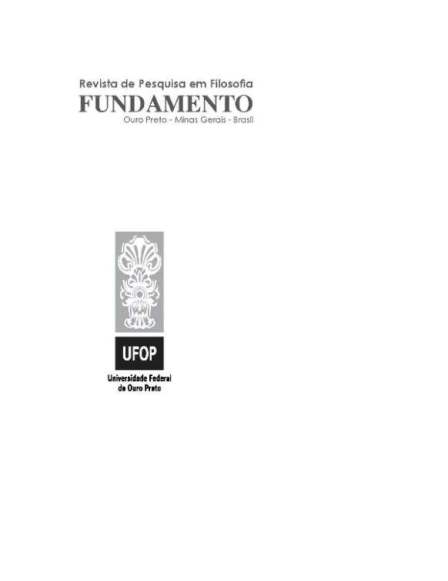Razões públicas como razões práticas
Resumo
Neste artigo analiso o modelo de razão pública de John Rawls. O artigo tem duas partes. A primeira analisa como nós podemos diferenciar razões públicas de outras razões. Proponho que um fato é uma razão pública se a explicação de por que ele conta como uma razão pode ser baseada exclusivamente em valores políticos. A segunda parte analisa quando a sentença “S tem uma razão pública para realizar ϕ” é um enunciado verdadeiro sobre o que uma pessoa, S, tem razões para fazer. Defendo a interpretação de que S tem uma razão para fazer ϕ apenas se a realização de ϕ por S promover algum desejo que S teria em reflexão apropriada.
Referências
BIRD, C. 1996. Mutual Respect and Neutral Justification. Ethics, v. 107, n.1, p. 62-96.
DANIELS, N. 1996. Justice and Justification: Reflective Equilibrium in Theory and Practice. Cambridge: Cambridge University Press.
DEPAUL, M. 1993. Balance and Refinement: Beyond Coherence Methods of Moral Inquiry. London: Routledge.
FRIEDMAN, M. 2000. John Rawls and the Political Coercion of Unreasonable People. In: DAVION, V; WOLF, C (org.). The Idea of Political Liberalism. New York: Rwoman & Littlefield Publishers, p. 16-33.
GAUS, G. 2011. The Order of Public Reason: A Theory of Freedom and Morality in a Diverse and Bounded World. New York: Cambridge University Press.
KELLY, T; MCGRATH, S. 2010. Is Reflective Equilibrium Enough?. Philosophical Perspectives, v.24, p. 325-359.
MACEDO, S. 1997. In Defense of Liberal Public Reason: Are Slavery and Abortion Hard Cases?. The American Journal of Jurisprudence, v. 42, n. 1, p. 1-29.
NAGEL, T. 1987. Moral Conflict and Political Legitimacy. Philosophy & Public Affairs, v. 16, n. 3, p. 215-240.
PARFIT, D. 2011. On What Matters. Volume One. Oxford: Oxford University Press.
QUONG, J. 2011. Liberalism without Perfection. Oxford: Oxford University Press.
RAWLS, J. 2005. Political Liberalism. Expanded Edition. New York: Columbia University Press.
________. 1997. “The Idea of Public Reason Revisited”. The University of Chicago Law Review, v. 64, n.3, p. 765-807.
SCANLON, T. 1982. Contractualism and utilitarianism. In: SEN, A; WILLIAMS, B (eds.). Utilitarianism and Beyond. Cambridge: Cambridge University Press, p.103-128.
________. 2014. Being Realistic about Reasons. Oxford: Oxford University Press.
________. 1998. What We Owe to Each Other. Cambridge: Harvard University Press.
SCHROEDER, M. 2007. Slaves of the Passions. New York: Oxford University Press.
SIBLEY, W. M. 1953. The Rational versus the Reasonable. The Philosophical Review, v. 62, n. 4, p. 554-560.
SMITH, M. 1994. The Moral Problem. Oxford: Blackwell Publishing.
DANIELS, N. 1996. Justice and Justification: Reflective Equilibrium in Theory and Practice. Cambridge: Cambridge University Press.
DEPAUL, M. 1993. Balance and Refinement: Beyond Coherence Methods of Moral Inquiry. London: Routledge.
FRIEDMAN, M. 2000. John Rawls and the Political Coercion of Unreasonable People. In: DAVION, V; WOLF, C (org.). The Idea of Political Liberalism. New York: Rwoman & Littlefield Publishers, p. 16-33.
GAUS, G. 2011. The Order of Public Reason: A Theory of Freedom and Morality in a Diverse and Bounded World. New York: Cambridge University Press.
KELLY, T; MCGRATH, S. 2010. Is Reflective Equilibrium Enough?. Philosophical Perspectives, v.24, p. 325-359.
MACEDO, S. 1997. In Defense of Liberal Public Reason: Are Slavery and Abortion Hard Cases?. The American Journal of Jurisprudence, v. 42, n. 1, p. 1-29.
NAGEL, T. 1987. Moral Conflict and Political Legitimacy. Philosophy & Public Affairs, v. 16, n. 3, p. 215-240.
PARFIT, D. 2011. On What Matters. Volume One. Oxford: Oxford University Press.
QUONG, J. 2011. Liberalism without Perfection. Oxford: Oxford University Press.
RAWLS, J. 2005. Political Liberalism. Expanded Edition. New York: Columbia University Press.
________. 1997. “The Idea of Public Reason Revisited”. The University of Chicago Law Review, v. 64, n.3, p. 765-807.
SCANLON, T. 1982. Contractualism and utilitarianism. In: SEN, A; WILLIAMS, B (eds.). Utilitarianism and Beyond. Cambridge: Cambridge University Press, p.103-128.
________. 2014. Being Realistic about Reasons. Oxford: Oxford University Press.
________. 1998. What We Owe to Each Other. Cambridge: Harvard University Press.
SCHROEDER, M. 2007. Slaves of the Passions. New York: Oxford University Press.
SIBLEY, W. M. 1953. The Rational versus the Reasonable. The Philosophical Review, v. 62, n. 4, p. 554-560.
SMITH, M. 1994. The Moral Problem. Oxford: Blackwell Publishing.
Publicado
2016-11-10
Como Citar
Andreazza, T. M. (2016). Razões públicas como razões práticas. Fundamento, 1(8). Recuperado de https://periodicos.ufop.br/fundamento/article/view/2377
Seção
ARTIGOS INÉDITOS



